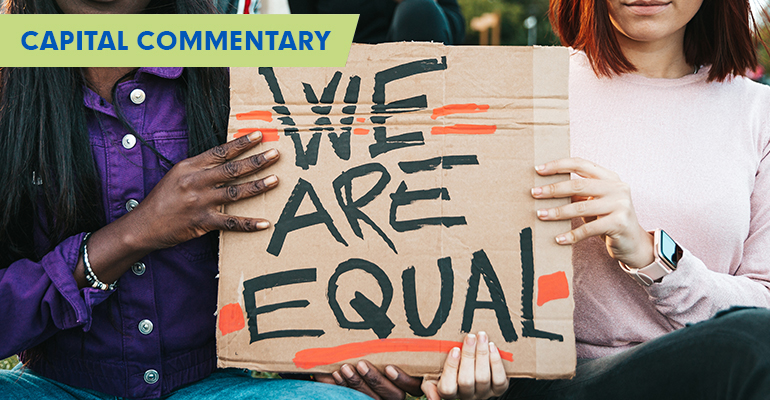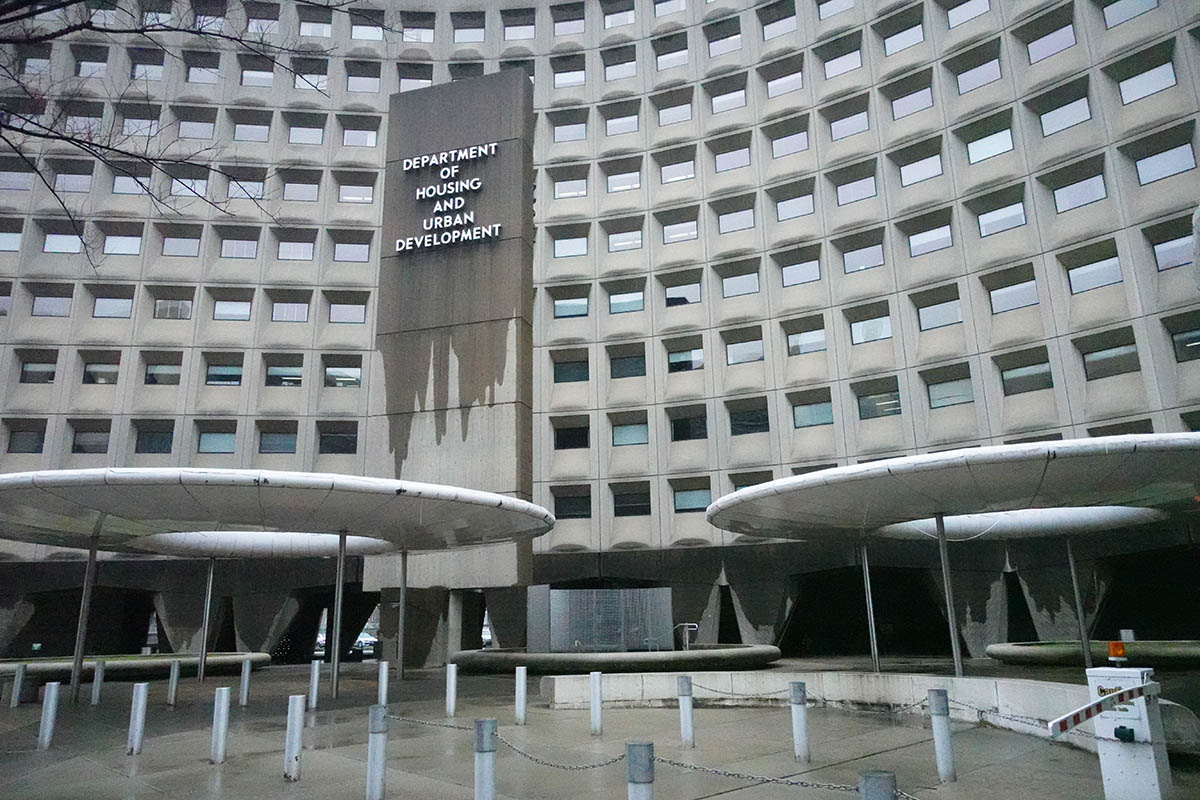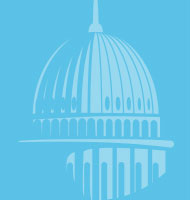
1,819 words. Six-and-a-half minute read.
Racial equity is driving agendas in Washington like never before.
A new study concluding that 1 million Black families could miss out on the benefits of homeownership by 2040. A Federal Reserve Governor warning that misuse of artificial intelligence (AI) could lead to digital redlining. A Senator promising to view his committee’s policy debates through the lens of racial justice. A new President in his first week in office issuing four executive orders designed to correct racial inequities.
At the beginning of Black History Month, we thought it is an appropriate time for Capital Commentary to take a deep dive into public policies designed to address and correct racial inequalities from the perspectives of think tanks, elected officials, financial regulators and legal experts. We finish the issue with Capital Commentary Contest No. 2, giving readers the chance to win the one-of-a-kind Capital Commentary/PolicyCast mug and saucer.
1. Dismal Outlook for Black Homeownership
The deck is already stacked against Black families seeking homeownership:
- The gap between White and Black homeownership – roughly 30 percentage points – is wider now than in the 1960s.
- Researchers discovered a “Black tax” to own homes.
- Whites hold 10 times the wealth of Black households.
Now comes a report from the Urban Institute (UI) that things will only get worse for Black families over the next two decades unless significant changes occur.
- UI’s Laurie Goodman and Jun Zhu conclude that the U.S. homeownership rate overall will decline by 2040 from 65% to 62% (Goodman is on Arch Capital Group Ltd.’s Board of Directors). “Though this may seem like a modest decline, it will have an enormous impact on each successive generation in their prime homebuying and equity-building years, especially Black Millennials and Black seniors,” they write.
“The impact on Black homeownership and implications for Black wealth building in the future are most dramatic.”
Homeownership rates have fallen for each generation since the Baby Boomers. The trend is expected to continue, say Goodman and Zhu.
- “These shortfalls are not shared equally among different racial groups. Younger Black Millennials, who will reach ages 45 to 54 in 2040, will have a homeownership rate of 41%, compared with the 50% homeownership rate among younger Black Baby Boomers at the same age — a 9 percentage-point difference.”
Depressing but not hopeless: While the forecast is bleak, “policymakers can significantly alter [projected outcomes] through changes we know how to make today,” they conclude.
How?
- Improving and expanding financial education and homeownership preparation.
- Increasing the visibility, access and types of down payment assistance programs.
- Expanding financing options to meet the needs of different types of creditworthy borrowers.
2. Biden Sets Equity Tone in Week One
Results like those found by Goodman and Zhu, coupled with historical housing discrimination, led President Biden to sign four Executive Orders in his first week aimed at racial equity.
- First on the list: Housing. The other three are targeted at eliminating privately operated penitentiaries, equity regarding the treatment of Native American tribes, and racism and intolerance regarding Asian Americans and Pacific Islanders.
“Housing is a right in America and homeownership is an essential tool to wealth creation and to be passed down to generations. Today, I’m directing [HUD] to redress historical racism in federal housing policies,” Biden said at a White House news event.
Biden detailed his reasons for the Order in a memorandum, outlining actions HUD will take during his administration:
- “Our Nation’s history has been one of great struggle toward this ideal. During the 20th century … governments systematically implemented racially discriminatory housing policies that contributed to segregated neighborhoods and inhibited equal opportunity and the chance to build wealth for [minorities] and other underserved communities.”
- He also ordered HUD to examine the impact of Trump administration actions on Affirmatively Furthering Fair Housing and Disparate Impact
3. Hill Dems Applaud Biden’s Orders
Biden’s actions won swift endorsements from Democrats in Congress.
- Maxine Waters (D-CA): “I’m pleased that President Biden has issued this important executive action to reassert the federal government’s commitment to fair housing and to begin to reverse the Trump administration’s harmful actions to erode fair housing.” She praised Biden “for recognizing the integral role housing plays in our continued fight for racial and economic justice.”
- Sherrod Brown (D-OH) lamented that “more than 50 years after Congress passed the Fair Housing Act, access to housing remains unequal,” before applauding Biden’s executive order. Recently, Brown, the new chairman of the Senate Banking, Housing and Urban Affairs Committee, declared that housing will be a priority of his committee, which will consider many policies through a “racial justice lens.”
Before Brown’s committee late last week, HUD-Secretary Designate Rep. Marcia Fudge (D-OH) emphasized her resolve to end discriminatory housing practices:
- “We need to make the dream of homeownership — and the security and wealth creation that comes with it — a reality for more Americans. That will require us to end discriminatory practices in the housing market and ensure that our fair housing rules are doing what they are supposed to do: opening the door for families, especially families of color who have been systematically kept out in the cold across generations, to buy homes and punch their ticket to the middle class,” she told the committee during her nomination hearing.
4. Fed Governor Warns of Digital Redlining
The ascension of AI in the financial services industry is likely to revolutionize how consumers and companies alike access and manage their finances, predicts the online trade publication Business Insider. AI can:
- Streamline tedious processes and vastly improve the customer experience by offering 24/7 access to their accounts and financial advice services.
- Alert customers about suspected fraud or price hikes in subscription services.
- Better predict and assess loan risks.
JPMorgan Chase implements AI to detect fraud patterns in credit card use. Fintech company Zest is determined to reduce racial disparities and “create a fairer credit economy” through its use of AI and machine learning.
- AI has promise to do good, but it is not without risks, says one financial regulator.
The pluses: “Machine learning models are being used to analyze traditional and alternative data in the areas of credit decision making and credit risk analysis, in order to gain insights that may not be available from traditional credit assessment methods and to evaluate the creditworthiness of consumers who may lack traditional credit histories,” said Federal Reserve Gov. Lael Brainard during a speech at a recent AI symposium in Washington.
- But beware the principle of “garbage in, garbage out,” she counsels.
The minuses: “It is important to be keenly alert to potential risks around bias and inequitable outcomes. For example, if AI models are built on historical data that reflect racial bias or are optimized to replicate past decisions that may reflect bias, the models may amplify rather than ameliorate racial gaps in access to credit,” said Brainard.
- One cause for concern is that the underlying calculations made by AI are opaque. And that, said Brainard, could lead to “digital redlining if [the systems are] not intentionally designed to address this risk.”
The stakes are high for both financial institutions and consumers.
- “To ensure that the model comports with fair lending laws that prohibit discrimination … firms need to understand the basis on which a machine learning model determines creditworthiness. Unfortunately, we have seen the potential for AI models to operate in unanticipated ways and reflect or amplify bias in society.”
5. Housing Industry Under Microscope

The political realignment in Washington means all eyes will be on housing finance industry participants for fair-lending compliance, predicts attorney Jeff Naimon, a fair-lending expert at the firm Buckley LLC.
“We’ve seen a lot of advocates focusing on what they call ‘systemic racism’ and they’re looking at every piece of the industry and every part of society as having a part in having created and perpetuated it in financial services,” Naimon told me during a recent Arch MI PolicyCast podcast (click to listen).
- Naimon’s comments were prescient. Soon after, the Consumer Financial Protection Bureau (CFPB) made clear that fair lending will be atop its agenda, too.
- “It’s … time the CFPB take bold and swift action on racial equity,” Acting Director Dave Uejio wrote to Bureau employees.
“I know this is close to the hearts of many of you. The country is in the middle of a long overdue conversation about race, and as we all know, practices and policies of the financial services industry have both caused and exacerbated racial inequality.” – CFPB Acting Director Dave Uejio in a letter to employees.
- Uejio will “elevate and expand existing investigations and exams and add new ones to ensure we have a healthy docket intended to address racial equity.”
- The CFPB “will also look more broadly, beyond fair lending, to identify and root out unlawful conduct that disproportionately impacts communities of color and other vulnerable populations.”
What is Naimon’s advice to business? He emphasized three points:
- Understand what the government is trying to do. “They are not trying to ruin the company. They’re doing it because they have a policy vision of how they want the world to look.”
- Convey your commitment to fair lending. “It is important for everyone [in the company] to know you are trying to be nondiscriminatory. And it is all our jobs together, whether you are a credit analyst or customer-service worker,” to live up to fair lending laws.
- Test, test, test. “Have a good compliance management system in which you’re doing a lot of testing and monitoring,” he counseled. That will not only better inform you but reduce your risks measurably, he added.
Contest No. 2: Who’s in a Name?

Given the large number of notable Americans who have served the federal government in its capital city, there aren’t many federal buildings in Washington, D.C., named for people. Some of the more famous ones include the J. Edgar Hoover FBI building, the Robert F. Kennedy Justice Department headquarters and the Eisenhower Old Executive Office Building.
- Some buildings’ official names are not so famous. Like the one pictured above. Former HUD Secretary Ben Carson liked to say it was “the ugliest building in America with the hardest-working people.”
Granted, this photo was shot on a dreary day, but not even a sunny day much improves the look of the drab HUD building that features weird flying-saucer-like contraptions in its plaza.
The inside is no better. Its halls are so convoluted, I think there are people who entered during the Reagan administration still trying to find their way out.
Take the Quiz (two-part answer): (a) What is the official name of HUD’s headquarters? (b) Which singular distinction does the honoree hold?
Email your answers with the subject line “Capital Commentary Contest #2” to [email protected] by 11:59 ET Friday, Feb. 5, for a chance to win an Arch MI Capital Commentary/PolicyCast mug and saucer.
Answer to Capital Commentary Contest #1: Former President Richard Nixon is best remembered for talking about his dog 16 years before being elected President. What was that dog’s name?
- Answer: Checkers.

Do you think Capital Commentary offers valuable information on housing policy and its potential impacts? If you do, share your comments with us. Your feedback will help ensure Capital Commentary covers the stories that have the most impact on your business.

About Arch MI’s Capital Commentary
Capital Commentary newsletter reports on the public policy issues shaping the housing industry’s future. Each issue presents insights from a team led by Kirk Willison.
About Arch MI’s PolicyCast
PolicyCast — a video podcast series hosted by Kirk Willison — enables mortgage professionals to keep on top of the issues shaping the future of housing and the new policy initiatives under consideration in Washington, D.C., the state capitals and the financial markets.
Stay Updated
Sign up to receive notifications of new Arch MI PolicyCast videos and Capital Commentary newsletters.